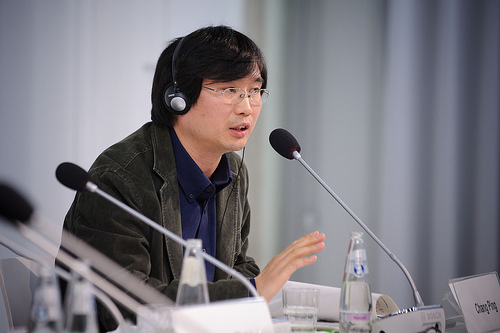Freedom of Speech Roundup
by Sampsonia Way / February 9, 2013 / No comments
In the weekly Freedom of Speech Roundup, Sampsonia Way presents some of the week’s top news on freedom of expression, journalists in danger, artists in exile, and banned literature.

Author and journalist Chang Ping speaks in Berlin in 2011. Photo: Stephan Röhl.
China: Media Censorship and its Future
China File. In a one-on-one interview, Chang Ping, former news director of China’s Southern Weekend discusses how the country’s censorship policies are becoming worse, despite the rapid growth of the Internet, and how social media is only a tool, dependent on the people who use it. He hopes, for the future, that press protests will help change the status quo and break taboos. Read here.
Saudi Journalist Sentenced Over Rape Report
Al Jazeera. An alleged rape victim and the journalist who interviewed her were each sentenced to one year in prison by a Somali court. The victim claimed government security forces raped her, but the courts found no medical evidence. Human rights groups, however, said the trial was a politically motivated cover-up. Read here.
To Be a Journalist in Pakistan
The Express Tribune. Writer Samira Shackle gives insight on what it means to be a reporter in Pakistan, a country that is often demonized by the media for having harsh censorship laws and bouts of oppression. She notes that while the government does have numerous problems, over the last decade many media outlets in Pakistan have been working to reveal corruption in the system. However, many journalists in Pakistan still practice self-censorship in order to separate themselves from criminal accusations. Read here.
Hero in Exile
The International News. Malala Yousufzai, the young Pakistani girl shot by the Taliban in October, is making a recovery in a British hospital and has been nominated for a Nobel Peace Prize. However, in all likelihood, she will never be able to return to her home in safety. As this opinion piece puts it, “Hers is going to be a life of eternal exile.” Read here.
For Bookworms, a Historic Event in Burma’s Biggest City
The Irrawaddy. Last week Burma held its first-ever international literary festival. Led by democratic party leader Aung San Suu Kyi, the festival featured local and international writers, as well as workshops, panel discussions, and individual readings. The event comes at a time when the country has begun to relax its censorship laws. Read here.
The three-day Irrawaddy Literary Festival marked the first open exchange of ideas between local and foreign writers in Burma after decades of publishing restrictions and government censorship.Video: Voice of America, YouTube.
Nepal Journalists Flee after Receiving Threats
Committee to Protect Journalists. Twenty-two journalists recently fled Dailekh after receiving death threats from supporters of Prime Minister Baburam Bhattarai. The journalists were protesting the 2004 murder of a journalist and believed that Bhattarai interfered with the arrest of individuals who may have been connected with the case. Many of the journalists have sought refuge in a nearby village and will not return until the government gives them protection. Read here.
Censorship in Kashmir: Author Basharat Peer Gives His Account
The Guardian. When author Basharat Peer worked as a journalist in India-controlled Kashmir he found that many newspapers editors and rape victims were silenced by the government. He gives a personal account of the censorship and violence that occurred as a result of the conflict in Kashmir in his book The Curfewed Night. Read here.
Mt. Lebanon library says Partially Nude Woman in Photo Exhibit Breaks Rules
Pittsburgh Post-Gazette. After Mt. Lebanon Public Library officials asked photographer John Flatz to replace his photo in the library’s exhibition of his architectural photographs, he refused. The photo depicts a painting of a woman with an exposed breast hanging in the Mercer County Courthouse. The library has not removed the photograph, though Flatz covered the offending breast with a picture of a bra and an arrow pointing to it saying, “Censored by the Mt. Lebanon Public Library.” Read here.
Kuwait says it Backs Free Speech but Must Protect Ruling Emir
Reuters. A Twitter user in Kuwait was sentenced to five years in prison for insulting the emir via the social networking site. While Kuwait is considered a more liberal country in the Gulf region, this jailing follows a long history of censorship. The government has penalized several Twitter users for criticizing the emir, who is described as “immune and inviolable” in the constitution. Read here.




